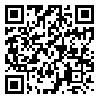Volume 12, Issue 3 (May-June 2013)
Payesh 2013, 12(3): 243-253 |
Back to browse issues page
Download citation:
BibTeX | RIS | EndNote | Medlars | ProCite | Reference Manager | RefWorks
Send citation to:



BibTeX | RIS | EndNote | Medlars | ProCite | Reference Manager | RefWorks
Send citation to:
Homeira Fallahi, Sedigheh Sadat Tavafian, Farideh Yaghmaie, Ebrahim Hajizadeh. Living with HIV: a qualitative research. Payesh 2013; 12 (3) :243-253
URL: http://payeshjournal.ir/article-1-366-en.html
URL: http://payeshjournal.ir/article-1-366-en.html
1- Faculty of Nursing & Midwifery, Shahid Behashti University of Medical Sciences, Tehran, Iran
2- Department of Health Education, Faculty of Medical Sciences, Tarbiat Modaress University, Tehran, Iran
3- Department of Nursing, Shahid Behashti University of Medical science, Faculty of Nursing & Midwifery, Tehran, Iran
4- Department of Biostatistics, Faculty of Medical Sciences, Tarbiat Modares University, Tehran, Iran
2- Department of Health Education, Faculty of Medical Sciences, Tarbiat Modaress University, Tehran, Iran
3- Department of Nursing, Shahid Behashti University of Medical science, Faculty of Nursing & Midwifery, Tehran, Iran
4- Department of Biostatistics, Faculty of Medical Sciences, Tarbiat Modares University, Tehran, Iran
Abstract: (7382 Views)
Objective (s): To investigate on consequences of living with HIV/AIDS.
Methods: This was a qualitative study. Initially we selected a convenience sample and then narrowed-down the sample by maximum diversity in terms of age and education. Data was collected via semi-structured interviews. All interviews were recorded and transcribed, and the codes were extracted after reviewing them several times. Content analysis was performed to explore the data.
Results: In all 34 participants were interviewed: 32 HIV positive men (with age average: 37.5 years and standard deviation: 7.13) and 4 HIV positive women (with age average: 34 years and standard deviation: 3.04) Participants indicated the following consequences: social, psychological, physical and economic. Most participants referred to adverse social outcome as the most important consequences of living with HIV/AIDS. The most important social adverse effect mentioned by participants was stigma, discrimination and exclusion.
Conclusion: The findings suggest that stigma and discrimination should be lessening for people who live with HIV/AID. Perhaps media could play an important role to achieve this.
Methods: This was a qualitative study. Initially we selected a convenience sample and then narrowed-down the sample by maximum diversity in terms of age and education. Data was collected via semi-structured interviews. All interviews were recorded and transcribed, and the codes were extracted after reviewing them several times. Content analysis was performed to explore the data.
Results: In all 34 participants were interviewed: 32 HIV positive men (with age average: 37.5 years and standard deviation: 7.13) and 4 HIV positive women (with age average: 34 years and standard deviation: 3.04) Participants indicated the following consequences: social, psychological, physical and economic. Most participants referred to adverse social outcome as the most important consequences of living with HIV/AIDS. The most important social adverse effect mentioned by participants was stigma, discrimination and exclusion.
Conclusion: The findings suggest that stigma and discrimination should be lessening for people who live with HIV/AID. Perhaps media could play an important role to achieve this.
type of study: Descriptive |
Accepted: 2012/04/14 | ePublished ahead of print: 2013/04/24 | Published: 2013/05/15
Accepted: 2012/04/14 | ePublished ahead of print: 2013/04/24 | Published: 2013/05/15
| Rights and Permissions | |
 |
This work is licensed under a Creative Commons Attribution-NonCommercial 4.0 International License. |





